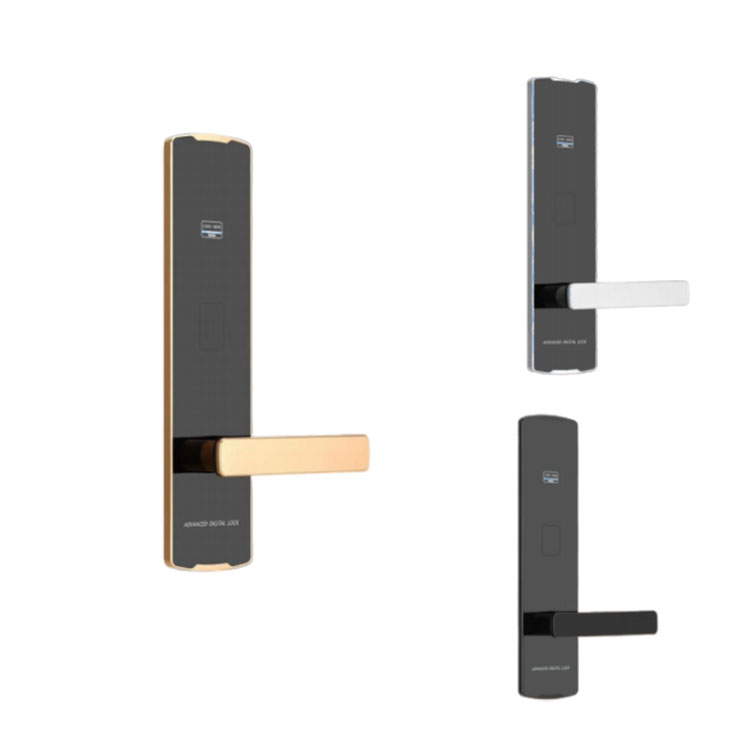- English
- Español
- Português
- русский
- Français
- 日本語
- Deutsch
- tiếng Việt
- Italiano
- Nederlands
- ภาษาไทย
- Polski
- 한국어
- Svenska
- magyar
- Malay
- বাংলা ভাষার
- Dansk
- Suomi
- हिन्दी
- Pilipino
- Türkçe
- Gaeilge
- العربية
- Indonesia
- Norsk
- تمل
- český
- ελληνικά
- український
- Javanese
- فارسی
- தமிழ்
- తెలుగు
- नेपाली
- Burmese
- български
- ລາວ
- Latine
- Қазақша
- Euskal
- Azərbaycan
- Slovenský jazyk
- Македонски
- Lietuvos
- Română
- Slovenski
- Eesti Keel
What types of hotel apartment locks are there?
In accommodation scenarios such as hotels and apartments, door locks are not only the first barrier for security protection, but also a key link to improve operational efficiency and guest experience. With the development of technology, hotel apartment locks have been upgraded from traditional mechanical forms to multiple intelligent forms to meet the management needs of different scenarios.

Mechanical locks: a classic and durable basic choice
Mechanical locks are the most traditional form of door locks in hotel apartments. With the characteristics of simple structure, low cost and easy maintenance, they are still used in some economy hotels and long-term rental apartments. Common blade locks and pin locks are opened and closed by mechanical engagement between keys and lock cylinders. The keys can be configured with master and secondary keys according to needs - the master key is for management personnel to use, and the secondary key is given to tenants. When the lease is terminated, the lock cylinder can be replaced to ensure safety. However, mechanical locks have the problem of easy loss of keys and high management costs, and are more suitable for scenarios with stable passenger flow and cost sensitivity.
Magnetic card locks: the primary form of digital management
Magnetic card locks were once the mainstream choice for mid- to high-end hotels, and unlocking was achieved by induction of information in the magnetic card and the lock. When guests check in, the front desk writes the room information into the magnetic card, and cancels the permissions when checking out. There is no need to recycle the physical key, which greatly improves the reception efficiency. The magnetic card lock also supports hierarchical management, and different permissions such as master card, floor card, and room card can be set to facilitate the hotel staff to work in different areas. However, its magnetic stripe is easily affected by magnetic field interference and fails, and the card needs to be re-made after it is lost, and it is gradually replaced by more advanced technology.
IC card lock: a safe choice for encryption upgrades
IC card locks upgrade encryption technology based on magnetic card locks, using chips to store information, and have anti-copying and anti-interference characteristics. The key encryption system in the IC card makes it much more difficult to copy the card, and the security is significantly enhanced. In operation, the IC card lock can be linked with the hotel management system to automatically record the door opening time and card number, which is convenient for tracing abnormal situations. Some IC card locks also support offline operation, which can be used normally even if the network is interrupted, which is suitable for apartment projects with unstable network environment.
Password lock: a convenient solution for contactless unlocking
The password lock is opened by entering a preset password, without the need to carry a physical key, and is deeply favored by young customers. Hotels can set temporary passwords, and guests can check in by receiving the passwords through their mobile phones, reducing front desk contact; long-term rental apartments can set fixed passwords, so tenants don't have to worry about losing their keys. Password locks support regular automatic password updates, or remote modification through the management background, so that the next tenant's safety can be guaranteed without changing the locks when leaving the apartment. Some high-end password locks also have a virtual password function, which can add random numbers when entering to prevent passwords from being peeped.
Fingerprint lock: Accurate experience of biometrics
Fingerprint locks use human biometrics as unlocking credentials, and their uniqueness and non-replicability make them more secure. Guests can enter their fingerprints when checking in, and they can unlock the door directly with their fingerprints, eliminating the trouble of carrying cards or remembering passwords. For high-end hotels and serviced apartments, fingerprint locks can enhance guests' technological experience and sense of dignity; in long-term rental apartments, fingerprint locks can be associated with tenant information to achieve automatic locking when rent is overdue, helping landlords to manage efficiently.
Bluetooth/APP locks: the future trend of smart interconnection
Bluetooth locks and APP locks are connected to locks through mobile phone Bluetooth or wireless network. Guests download the hotel or apartment APP and can unlock with their mobile phones after completing identity verification. This type of lock supports remote authorization. Landlords or hotel managers can temporarily unlock for visitors in a different location without handing over keys on site. They can also view door opening records in real time and report abnormal situations in a timely manner. Bluetooth/APP locks completely get rid of physical media, especially suitable for short-term rental apartments and homestays. They are seamlessly connected with online booking platforms to realize the digitalization of the entire process of "booking - check-in - check-out".
From mechanical locks to smart locks, the iteration of hotel apartment locks has always revolved around safety and convenience. In the future, with the development of Internet of Things technology, door locks will be further integrated into the smart ecology of accommodation space, bringing guests a more personalized check-in experience and providing operators with more efficient management solutions.




